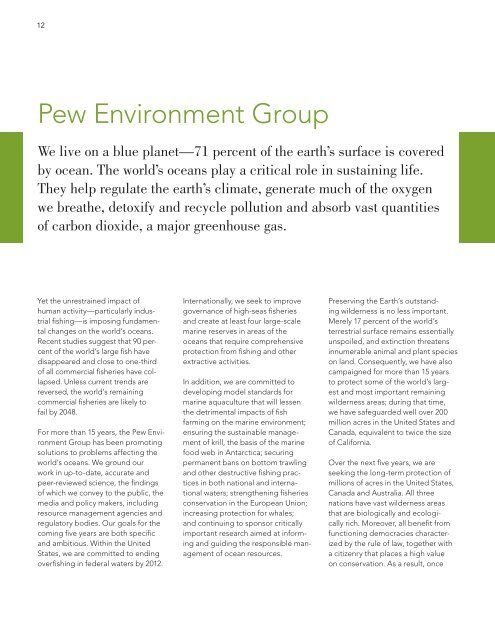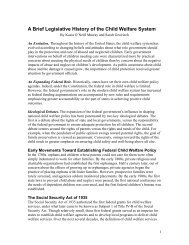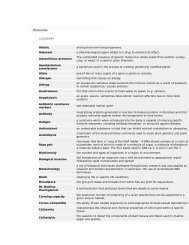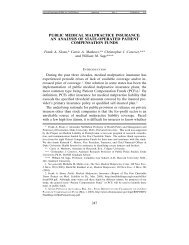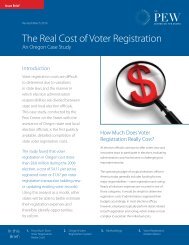PROSPECTUS - The Pew Charitable Trusts
PROSPECTUS - The Pew Charitable Trusts
PROSPECTUS - The Pew Charitable Trusts
You also want an ePaper? Increase the reach of your titles
YUMPU automatically turns print PDFs into web optimized ePapers that Google loves.
12<br />
<strong>Pew</strong> Environment Group<br />
We live on a blue planet—71 percent of the earth’s surface is covered<br />
by ocean. <strong>The</strong> world’s oceans play a critical role in sustaining life.<br />
<strong>The</strong>y help regulate the earth’s climate, generate much of the oxygen<br />
we breathe, detoxify and recycle pollution and absorb vast quantities<br />
of carbon dioxide, a major greenhouse gas.<br />
Yet the unrestrained impact of<br />
human activity—particularly industrial<br />
fishing—is imposing fundamental<br />
changes on the world’s oceans.<br />
Recent studies suggest that 90 percent<br />
of the world’s large fish have<br />
disappeared and close to one-third<br />
of all commercial fisheries have collapsed.<br />
Unless current trends are<br />
reversed, the world’s remaining<br />
commercial fisheries are likely to<br />
fail by 2048.<br />
For more than 15 years, the <strong>Pew</strong> Environment<br />
Group has been promoting<br />
solutions to problems affecting the<br />
world’s oceans. We ground our<br />
work in up-to-date, accurate and<br />
peer-reviewed science, the findings<br />
of which we convey to the public, the<br />
media and policy makers, including<br />
resource management agencies and<br />
regulatory bodies. Our goals for the<br />
coming five years are both specific<br />
and ambitious. Within the United<br />
States, we are committed to ending<br />
overfishing in federal waters by 2012.<br />
Internationally, we seek to improve<br />
governance of high-seas fisheries<br />
and create at least four large-scale<br />
marine reserves in areas of the<br />
oceans that require comprehensive<br />
protection from fishing and other<br />
extractive activities.<br />
In addition, we are committed to<br />
developing model standards for<br />
marine aquaculture that will lessen<br />
the detrimental impacts of fish<br />
farming on the marine environment;<br />
ensuring the sustainable management<br />
of krill, the basis of the marine<br />
food web in Antarctica; securing<br />
permanent bans on bottom trawling<br />
and other destructive fishing practices<br />
in both national and international<br />
waters; strengthening fisheries<br />
conservation in the European Union;<br />
increasing protection for whales;<br />
and continuing to sponsor critically<br />
important research aimed at informing<br />
and guiding the responsible management<br />
of ocean resources.<br />
Preserving the Earth’s outstanding<br />
wilderness is no less important.<br />
Merely 17 percent of the world’s<br />
terrestrial surface remains essentially<br />
unspoiled, and extinction threatens<br />
innumerable animal and plant species<br />
on land. Consequently, we have also<br />
campaigned for more than 15 years<br />
to protect some of the world’s largest<br />
and most important remaining<br />
wilderness areas; during that time,<br />
we have safeguarded well over 200<br />
million acres in the United States and<br />
Canada, equivalent to twice the size<br />
of California.<br />
Over the next five years, we are<br />
seeking the long-term protection of<br />
millions of acres in the United States,<br />
Canada and Australia. All three<br />
nations have vast wilderness areas<br />
that are biologically and ecologically<br />
rich. Moreover, all benefit from<br />
functioning democracies characterized<br />
by the rule of law, together with<br />
a citizenry that places a high value<br />
on conservation. As a result, once


